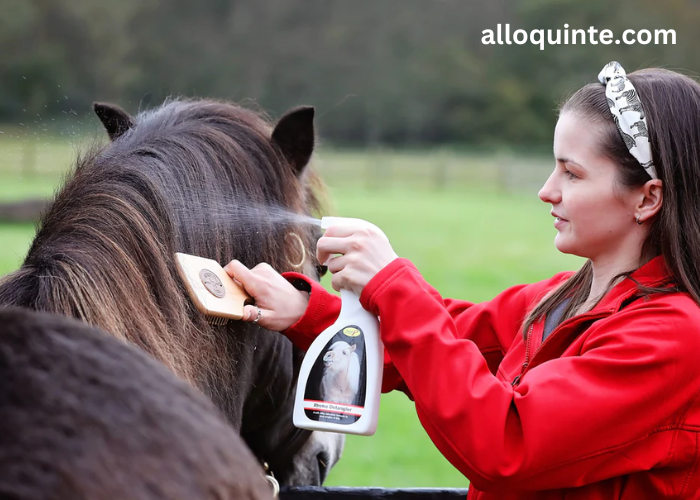Owning a horse is a rewarding experience that requires dedication, knowledge, and commitment. For new horse owners, understanding the fundamentals of horse care is crucial to ensuring the well-being of their equine companion. This guide covers the essential aspects of horse care, from feeding and grooming to health management and general maintenance. Discover the finest quality turf products at AbdellatifTurf. Your one-stop shop for premium turf solutions.
1. Proper Nutrition and Feeding
A balanced diet is vital for your horse’s health. Horses are grazing animals and require a diet primarily composed of roughage, such as hay or pasture grass.
- Hay and Pasture: Quality hay or pasture should make up the majority of your horse’s diet. Ensure the hay is free from mold and dust. If pasture grazing, make sure the area is safe and free from toxic plants.
- Concentrates: Depending on your horse’s workload, age, and health, you may need to supplement their diet with grains or concentrates. Consult with a veterinarian or equine nutritionist to determine the appropriate type and amount.
- Fresh Water: Horses need constant access to clean, fresh water. A dehydrated horse can quickly develop serious health issues, so ensure water sources are clean and regularly refilled.
- Minerals and Salt: Provide a salt block and mineral supplements to ensure your horse gets essential nutrients that may not be present in their regular diet.
2. Regular Grooming
Grooming is not only about keeping your horse clean but also about building a bond and monitoring their health.
- Daily Brushing: Regular brushing removes dirt, loose hair, and promotes a healthy coat. Use a curry comb to loosen dirt and debris, followed by a stiff brush to remove it, and finish with a soft brush for a shiny coat.
- Hoof Care: Clean your horse’s hooves daily with a hoof pick to remove dirt, stones, and prevent thrush. Regular hoof trimming by a farrier is also essential to maintain hoof health and prevent lameness.
- Bathing: Horses do not need frequent baths, but occasional washing with a mild horse shampoo can help keep their coat and skin healthy. Ensure the horse is thoroughly rinsed and dried.
3. Stable and Pasture Management
A safe and comfortable living environment is crucial for your horse’s well-being.
- Clean Stalls: If your horse is stabled, clean their stall daily to remove manure and soiled bedding. Provide fresh bedding for comfort and to prevent hoof problems.
- Safe Pasture: Ensure the pasture is well-maintained with safe, secure fencing. Regularly check for hazardous plants, debris, and holes that could cause injury.
- Shelter: Provide adequate shelter from extreme weather conditions, whether it’s a run-in shed in the pasture or a well-ventilated barn.
4. Health Care
Regular veterinary care is essential to monitor and maintain your horse’s health.
- Vaccinations: Keep up with your horse’s vaccination schedule to protect against common diseases such as tetanus, West Nile virus, and equine influenza.
- Deworming: Develop a deworming plan based on your horse’s age, environment, and fecal egg count tests. Rotating dewormers can help prevent resistance.
- Dental Care: Horses need regular dental check-ups to ensure they can chew their food properly and avoid dental issues. Floating (filing down) sharp edges on their teeth may be necessary.
- Body Condition Monitoring: Regularly check your horse’s body condition to ensure they are maintaining a healthy weight. Adjust their diet and exercise as needed.
5. Exercise and Mental Stimulation
Physical activity is essential for your horse’s physical and mental health.
- Regular Exercise: Depending on your horse’s age, breed, and workload, provide appropriate levels of exercise. This could include riding, lunging, or turnout in a pasture.
- Mental Enrichment: Horses are intelligent animals that benefit from mental stimulation. Provide toys, varied environments, and training sessions to keep them engaged.
6. Recognizing Signs of Illness
Being able to recognize early signs of illness can make a significant difference in your horse’s health outcomes.
- Behavioral Changes: Sudden changes in behavior, such as lethargy, aggression, or loss of appetite, can indicate a health problem.
- Physical Signs: Look for signs such as lameness, swelling, abnormal discharge, or changes in coat condition.
- Vital Signs: Learn to check your horse’s vital signs, including temperature, pulse, and respiration rate. Familiarize yourself with what’s normal for your horse so you can detect abnormalities.
Caring for a horse is a significant responsibility that requires knowledge, time, and commitment. By following these essential care tips, new horse owners can ensure their horses are healthy, happy, and well-cared for. Building a strong relationship with your horse through proper care and attention will lead to a rewarding and fulfilling experience for both you and your equine companion.




